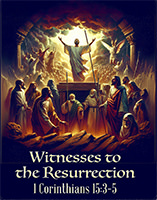First Corinthians 15:1–11 . . .
The Resurrection of Christ
So surprising and tragic is the fact that most people give more thought to vacations and relocations than they do their eternal destination and their quality of life there; we seldom prepare for our trip to our eternal home. Hopefully, as we study First Corinthians 15 — the “Resurrection chapter” — over the next three sessions, you’ll become better prepared for eternity.
This chapter is the longest chapter of any New Testament epistle! In it, Paul spent much time on this topic, because the Corinthians had come to believe in life after death without bodily resurrection.
In today’s eleven verses, Paul imparts two life-changing features of the gospel.
1) The gospel is trustworthy (15:1–8, see this passage at the bottom of the page) In this first section, Paul explains the makeup of our relationship with God, emphasizing the validity of the resurrection. Paul doesn’t try to prove that Christ’s resurrection actually happened; he assumes instead the resurrection as fact, that Christ rose from the dead. He reminds his readers of what the gospel is: the term “gospel” means good news. This is the message that Paul preached to the Corinthians during the eighteen months he served as their pastor.
Paul has great confidence in this gospel message, because Christ’s death and resurrection are prophetically and historically verifiable. In vv. 3–5, he clearly and succinctly shares the core elements of the gospel. An important phrase immediately jumps out because it’s repeated in vv. 3–4: “according to the Scriptures.” In the Old Testament, God predicted that Christ would die and rise again. One of the strongest arguments that Jesus is the Christ is how he fulfilled Old Testament prophecy. In v. 3, Paul states that he delivered to the Corinthians the gospel he’d received from other apostles. This gospel was “of first importance” and foundational to everything else in the Christian life. (Underline “of first importance” in your Bible.) The gospel is non-negotiable, because it didn’t originate from Paul or any other man; rather it was received from God, then delivered to people. It’s God’s gospel, not ours.
Here are the facts of the gospel.
Fact 1: “Christ died for our sins.” Fact 2: “he was buried.” Fact 3: “he was raised.” Fact 4: the resurrected Christ was seen by many.
Apostle Paul moves from the gospel message to making a strong argument for the resurrection of Christ, i.e., historically verifiable witnesses, including himself (vv. 6–8). His main argument is that there were still eyewitnesses to the resurrection who were living when he wrote this first letter to the Corinthians; he’s inviting people to check out the reality of the resurrection for themselves.
Paul gives another convincing proof: Jesus also appeared to James — Jesus’ half-brother — who didn’t believe in Jesus until after the resurrection. After his encounter with the resurrected Christ, James became the leader of the Jerusalem church.
In v. 6, Paul states that some of the believers who witnessed Jesus “have fallen asleep.” The Greek verb translated “sleep” (koimao) is often used in the Bible as a euphemism for death when speaking of believers: While unbelievers “die,” believers who’ve “fallen asleep” will one day “wake up” out of death.
2) The gospel is life-changing (vv. 9–11) Paul explains that the proof of the gospel is its inherent power to change lives. He’ll demonstrate this by sharing three characteristics. First, the gospel leads to the recognition of sin. Second, the gospel results in a total transformation of character. Third, the gospel produces a redirection of one’s entire life.
In the middle of v. 11, Paul reiterates what he wrote in v. 1. The “we” in “we preach” includes all of the apostles; the present tense conveys that their message continues to have relevance today.
Note: 1st Corinthians challenges believers to examine every aspect of their lives through the lens of the Gospel. In chapters 15–16, Paul presents these two lessons:
The resurrection of Christ (ch. 15) | Collections for the Lord’s people (ch. 16)
› Watch BibleProject’s superb animated video (1 minute) that highlights Paul’s messages in these two chapters.
† Summary of 1 Corinthians 15:1–11
In this opening passage of chapter 15, Apostle Paul presents his summary of the gospel message, focusing on Jesus’ resurrection. Key points include:
• The Gospel Message
Paul reminds the Corinthians of the gospel account that he preached to them:
† Christ died for our sins “according to the Scriptures.”
† He was buried.
† He was raised on the third day “according to the Scriptures.”
• Witnesses to the Resurrection
Several appearances of the risen Christ are cited by Paul:
† To Cephas (Peter) and the Twelve (v. 5).
† To more than 500 believers at once (v. 6).
† To James, then all the apostles (v. 7).
Last of all, to Paul himself (v. 8).
• Paul’s Apostleship
Finally, Paul acknowledges his unique position (vv. 9–11):
† He considers himself “the lest of the apostles.”
† He emphasizes God’s grace in his calling.
† He states that he worked harder than all the other apostles (v. 10).
• Unity in Preaching
The apostle Paul concludes by affirming that whether it was him or one or more of the other apostles, they all preach the exact same message about Christ’s resurrection, which the Corinthians believed.
- Q. 1 Are you sure that if you were to die today that you’d go to heaven? Do you believe that other people can have that same assurance? On what basis do you have such confidence?
- Q. 2 How would you explain the importance of Christ’s resurrection to a non-Christian?
- Q. 3 Why do you suppose Paul went into such detail listing who saw Jesus after he was resurrected?
1 Corinthians 15:1–11
New International Version (NIV)
[You can view it in a different version by clicking here; you can also listen to this chapter.]
The Resurrection of Christ
15 Now, brothers and sisters, I want to remind you of the gospel I preached to you, which you received and on which you have taken your stand. 2By this gospel you are saved, if you hold firmly to the word I preached to you. Otherwise, you have believed in vain.
3For what I received I passed on to you as of first importance: that Christ died for our sins according to the Scriptures, 4that he was buried, that he was raised on the third day according to the Scriptures, 5and that he appeared to Cephas, and then to the Twelve. 6After that, he appeared to more than five hundred of the brothers and sisters at the same time, most of whom are still living, though some have fallen asleep. 7Then he appeared to James, then to all the apostles, 8and last of all he appeared to me also, as to one abnormally born.
9For I am the least of the apostles and do not even deserve to be called an apostle, because I persecuted the church of God. 10But by the grace of God I am what I am, and his grace to me was not without effect. No, I worked harder than all of them — yet not I, but the grace of God that was with me. 11Whether, then, it is I or they, this is what we preach, and this is what you believed.


